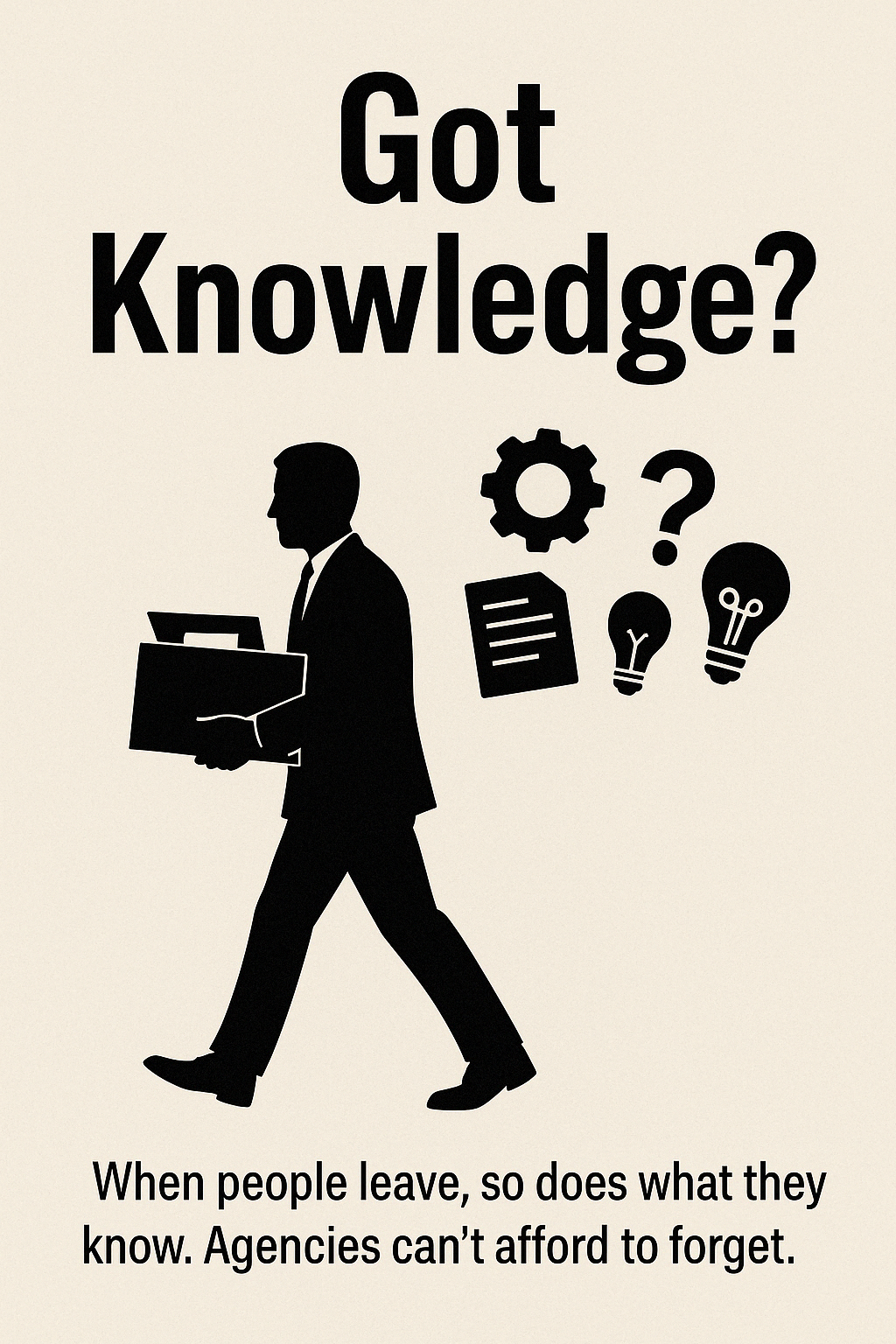“Got Knowledge? Why Government Downsizing is Also a Knowledge Crisis.”

Got Knowledge?
We all remember the iconic “Got Milk?” campaign—a simple question that packed a punch. Today, I want to borrow that format to ask something just as critical in the public sector: Got knowledge? Because if we’re being honest, a lot of agencies are losing it.
Right now, government agencies nationwide are experiencing a wave of workforce reductions, retirements, voluntary early buyouts, DRPs, and RIFs are reshaping the landscape faster than most leaders are prepared for. The Office of Personnel Management projects that more than one-third of federal employees are eligible to retire, and many are taking that opportunity. When they go, they’re not just leaving behind an empty seat—they’re taking decades of institutional knowledge that may never be recovered.
The Unspoken Casualty of Downsizing: Knowledge We often talk about the numbers—how many are leaving, how many positions are being cut—but we’re not talking enough about what’s being lost in terms of intellectual capital. It’s not just the “what” of a job that leaves—it’s the “how,” the “why,” and the workaround that no one else even knows exists. Many of those exiting are the backbone of their agencies—the ones who’ve weathered reorganizations, tech changes, leadership shifts, and policy swings. They hold the history, the nuance, and the unspoken systems that keep the wheels turning. And here’s the problem: most of that knowledge is undocumented.
SOPs: Missing in Action Let’s talk SOPs—Standard Operating Procedures. Ideally, they should be detailed, up-to-date, and accessible. But in reality? Many agencies either lack formal SOPs altogether, or the ones they have are outdated, inconsistent, or not embedded into everyday practice. In my work across HR and Human Capital Management, I’ve seen this firsthand: talented, committed people leave, and suddenly their teams are left scrambling—because no one ever took the time to capture their workflows, decisions, or critical context. Not because they didn’t care—but because documentation was never prioritized or incentivized.
A Strategic Risk, Not Just an Admin Task This isn't just a paperwork issue—it’s a strategic risk. A 2023 Deloitte study found that government leaders acknowledge knowledge loss as a major concern, but only a few have a clear strategy to address it. That’s a disconnect we can’t afford, especially now. When someone with 25 years of experience in grants management or procurement policy walks out under a DRP or retirement package, and their entire process exists only in their inbox, it doesn’t just slow down operations—it breaks them. And when these departures are happening in mass, the effect is exponential.
My Perspective as an HR Leader As someone who's spent years helping agencies navigate workforce transitions, I believe we need to stop treating knowledge transfer as optional or “nice to have.” It’s time to: Embed knowledge transfer into offboarding processes, especially during the drain taking place now. Pair seasoned employees with newer staff for structured shadowing and knowledge exchange before any formal exit begins. Normalize documentation as part of everyday culture, not just a final checkbox when someone’s walking out the door. And let's not forget the emotional impact here. These aren't just processes we're losing, these are people with stories, relationships, and wisdom. It's on leadership to honor their contributions by ensuring what they’ve built doesn’t disappear with them.
A Call to Action Here’s what every agency should be doing right now: Assess where institutional knowledge lives—and if it's written down. Identify your key knowledge holders. Who are your go-to people? What happens if they leave tomorrow? Establish or update your SOP framework. Not just policies, actual step-by-step guides that make sense to new staff. Create internal task forces focused on knowledge continuity as part of your workforce planning.